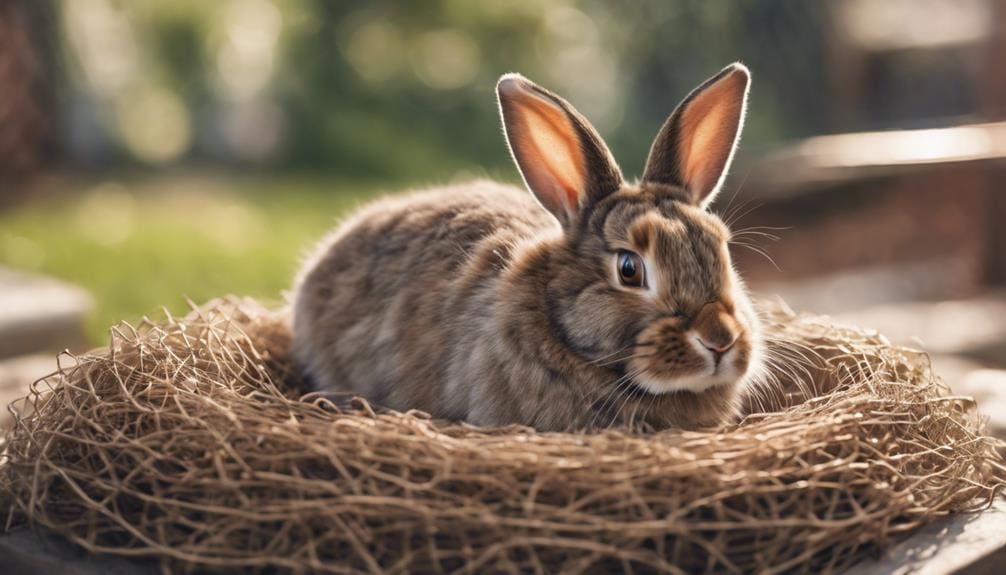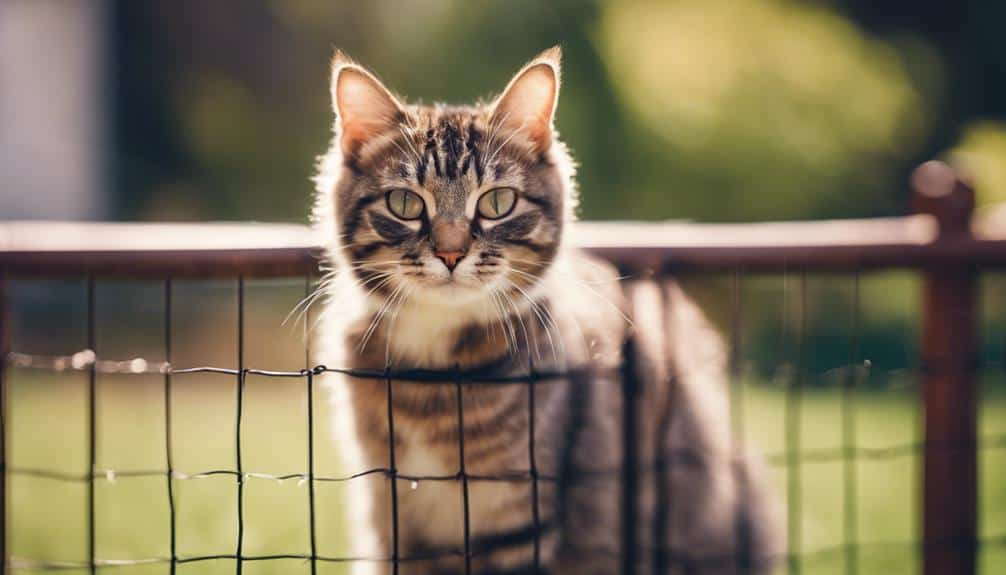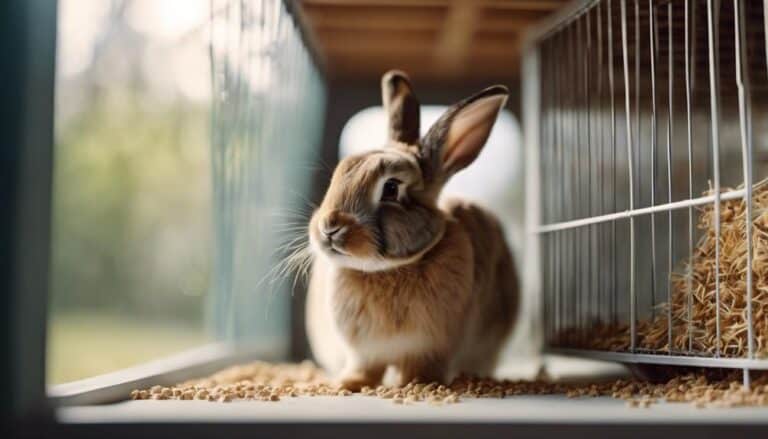Keeping outdoor bunnies safe from your neighbor's cat can be tough, but there are some effective ways to protect them.
First, you'll need to create a secure enclosure. This is probably the most important step in keeping your bunnies safe. The enclosure should be escape-proof and cat-proof. You can use chicken wire or hardware cloth to build a fence that's at least 3 feet high. Bury the fence 12 inches underground to prevent the cat from digging under.
Another way to keep your bunnies safe is to use natural deterrents. Cats don't like the smell of certain herbs and spices, such as lavender, mint, and cinnamon. Plant these in your yard or put them around the enclosure to keep the cat away. You can also try using citrus sprays or vinegar to deter the cat.
In addition to these measures, it's essential to be vigilant. Keep an eye on your bunnies when they're outside and make sure they have a safe place to hide if the cat shows up. Bring them inside if you notice the cat lurking around.
Remember, protecting your outdoor bunnies from your neighbor's cat requires a combination of proactive measures and ongoing vigilance. By creating a secure enclosure, using natural deterrents, and staying alert, you can outsmart the neighborhood cat and keep your bunnies safe.
Contents
Key Takeaways
So you've got outdoor bunnies and you're worried about your neighbor's cat getting to them. That's a valid concern! Here's what you can do to keep your bunnies safe.
First, try talking to your neighbors about cat-proofing the outdoor areas where your bunnies hang out. It's possible they're not even aware of the risk their cat poses, and they might be willing to work with you to find a solution.
Next, make sure your bunnies have a secure enclosure to retreat to when they're outside. This should have sturdy fencing and roofing to prevent the cat from getting in. Think of it like a bunny fortress!
It's also a good idea to provide your bunnies with plenty of hiding spots and escape routes within their enclosure. This could be things like tunnels, boxes, or even just some dense bushes. That way, if the cat does manage to get in, your bunnies will have somewhere to hide.
Another tactic is to use deterrents to keep the cat away in the first place. You could try installing motion detector lights, which will startle the cat if it comes near. There are also certain plants that are known to repel cats, like lavender or mint. Plant these around the perimeter of your enclosure to keep the cat away.
Finally, always keep an eye on your bunnies when they're outside, and have a plan in place in case the cat does show up. This could be something as simple as having a safe room in your house where you can quickly move your bunnies if you see the cat lurking around. With a little preparation and vigilance, you can keep your outdoor bunnies safe from your neighbor's cat.
Secure Nest Covering

Keeping your outdoor bunnies safe is a top priority, and one way to do that's by creating a secure nest covering. If you place a criss-cross of thread over the nest, you can easily check if the mother is returning to her babies. This simple method lets you keep track of the nest activity and confirms the mother is caring for her young ones.
Anchoring an inverted wicker basket over the nest is another great way to protect them from predators like dogs or cats. This physical barrier deters unwanted intruders, giving you peace of mind.
Dense vegetation is essential for rabbits, as it provides them with a sense of security in their environment. By using the natural surroundings to create a safe space, you can really enhance the well-being of your outdoor bunnies. And, by offering hiding places for the rabbits, you can further reduce the risk of cat attacks, allowing them to retreat to safety when needed.
Deterrent Options
Installing a six-foot fence can be a great way to keep stray cats out of your outdoor rabbit space. However, you'll need to take some extra steps to make sure it's completely cat-proof. Cats are super agile, so they can climb and jump pretty easily.
That's why you should consider adding some extra deterrents to your fence, like roller bars or angled extensions, to really discourage them from trying to get in.
Another good idea is to set up motion detector lights around the perimeter of your rabbit area. These will startle the cats and make them less likely to approach.
If you're worried about cats jumping into your rabbit enclosure from above, think about using covered runs or aviaries to create a safe outdoor space for your bunnies. You can also try planting cat-repellent herbs like lavender or mint around the enclosure to help keep them away.
It's also a good idea to provide some hiding spots and shelters for your rabbits, like wooden or plastic tunnels. That way, if a cat does manage to get in, your rabbits will have a safe place to hide.
Monitoring and Action

It's crucial to keep a close eye on your outdoor bunnies because their safety and well-being depend on it. You need to regularly check their surroundings to catch any potential threats or dangers that might pop up.
By doing so, you can respond quickly and take action to ensure their security.
Watchful Eyes Essential
Keeping your outdoor bunnies safe from your neighbor's cat requires constant vigilance. You need to regularly check on them and take action when necessary. With a watchful eye, you can spot potential risks or threats from the neighbor's cat.
Frequently checking the enclosure and surrounding area helps you identify any signs of intrusion or disturbances. Motion-activated cameras can capture cat sightings, giving you valuable evidence to take targeted action and protect your bunnies.
Regular supervision is crucial in detecting any stress or anxiety your outdoor bunnies may experience due to the cat's presence. This allows you to intervene promptly and offer them the necessary support. By monitoring the cat's behavior, you can understand its patterns and habits, enabling you to implement effective deterrents and safety measures.
Keeping a record of incidents or cat sightings is essential for tracking the effectiveness of your safety measures. This helps you make adjustments as needed to safeguard your beloved outdoor companions.
Swift Response Crucial
If you have outdoor bunnies, it's crucial to stay vigilant and take immediate action to protect them from your neighbor's cat. This cat can be a significant threat to your bunnies' safety, so swift responses are essential.
To detect the cat's presence promptly, regularly monitor the area where your bunnies are kept. You can also consider installing motion-activated cameras or alarms that will alert you when the cat approaches. This way, you can respond swiftly to the situation.
Creating a secure enclosure for your bunnies is key to keeping them safe. A cat-proof fence or covered run acts as a barrier against the cat's attempts to harm them. You can also place deterrents like citrus sprays or sticky tape around the enclosure to keep the cat at bay.
Having a well-thought-out emergency plan is also vital. If the cat is spotted, be prepared to move your bunnies to a safe indoor area promptly. By prioritizing swift responses and preparedness, you can effectively safeguard your outdoor bunnies from your neighbor's cat.
Neighbor Communication
Talking to your neighbors about the outdoor rabbits and the risks their cats pose can actually lead to some pretty positive outcomes.
When you raise awareness about the issue, you can work together to find a solution that keeps both the bunnies and the pet cats safe.
For example, you could discuss ways to fence off certain areas to keep the rabbits out and the cats in.
If your neighbors are willing, you could even offer to help them cat-proof their outdoor areas.
This can really foster a sense of community and shared responsibility for animal welfare.
Neighbor Awareness
Letting your neighbors know about the outdoor rabbits and the risks their cats can pose is crucial for keeping your pets safe. It's all about raising awareness about the dangers that free-roaming cats can pose to outdoor rabbits.
By talking openly with your neighbors, you can politely ask them to keep their cats indoors or provide secure outdoor enclosures. This can greatly reduce the risk of cat attacks on your rabbits.
Plus, offering to help your neighbors cat-proof their outdoor spaces can't only build community spirit but also protect your pets.
It's also important to educate your neighbors about the harm that domestic cats can cause to wildlife. This can help them understand why responsible pet ownership is vital.
By working together with your neighbors to create a cat-free zone around your outdoor rabbit area, you can create a safe environment for your pets. Implementing a cat-free zone requires cooperation and clear communication among neighbors, ensuring that everyone understands the importance of protecting pets. Additionally, when you establish this safe space, it’s crucial to follow the outdoor rabbit hutch construction steps to provide adequate shelter for your rabbits. A well-built hutch will not only keep your rabbits safe from predators but also offer them a comfortable and secure living environment.
Together, you can promote a harmonious relationship between pets and wildlife in your neighborhood, which ultimately protects your pets' welfare.
Effective Fence Solutions
One of the most important things you can do to keep your outdoor bunnies safe from cats is to talk to your neighbors about it. If you and your neighbors are on the same page, you can work together to create a safer environment for your furry friends.
Fencing is a crucial aspect of keeping your bunnies safe. You'll want to install a sturdy fence that's at least 6 feet tall to keep those cats from jumping over. The material you choose should have small openings, like chicken wire or hardware cloth, to prevent them from squeezing through. Additionally, you should bury the fence 12-18 inches underground to stop those cats from digging under and getting to your bunnies.
Planting cat-repellent plants like lavender or mint along the fence perimeter can be a clever trick. Cats don't like the smell of these plants, so they'll be less likely to hang around. It's also essential to have an open and honest conversation with your neighbors about keeping their cats indoors or providing secure outdoor enclosures. If everyone works together, you can significantly reduce the risk of cat attacks on your beloved outdoor bunnies.
Predator Prevention Measures

If you're concerned about keeping your outdoor bunnies safe from predators, especially cats, you'll want to take some precautions. Cats can be a significant threat to rabbits, but there are things you can do to protect them.
First, make sure your rabbits have plenty of hiding spots where they can escape from potential cat attacks and feel safe in their environment. Keep your rabbits well-fed, so they won't venture out in search of food and become vulnerable to cat predators.
You can create a safe space for your outdoor bunnies by using a cat-safe enclosure with strong fencing, secure roofing, and plenty of hiding spots and escape routes. Training your rabbits to return to their enclosures at night, possibly through positive reinforcement techniques like food rewards, can also reduce the risk of cat encounters.
For added security, consider installing motion-activated cameras to monitor cat activity in the area and provide an early warning system to safeguard your rabbits from potential threats. By taking these predator prevention measures, you can help keep your outdoor bunnies safe from your neighbor's cat.
Safety Measures Implementation
Creating a secure outdoor enclosure for your rabbits is crucial to keeping them safe from potential threats, especially pet cats. Think of it like this: if you can make your rabbits feel safe, they'll be less likely to get attacked by cats.
One way to do this is by providing multiple hiding spots within the enclosure. This way, your rabbits will have a place to run and hide if they sense any danger.
The fencing and roofing of the enclosure are also vital. You need to make sure they're sturdy enough to prevent cats from getting in. Consider installing covered runs or aviaries to protect your rabbits from aerial attacks by cats. And, to take it a step further, you could install motion-activated cameras to monitor the area for any cat presence.
Regular supervision is key to keeping your rabbits safe. You need to regularly check the enclosure and its surroundings to identify and mitigate potential risks.
It's also a good idea to inform your neighbors about the presence of outdoor rabbits and the dangers their pet cats pose. This might prompt them to keep their cats indoors or secure them in cat-proof enclosures, reducing the risk of cat attacks on your rabbits.
Conclusion
So, you want to keep your outdoor bunnies safe from your neighbor's cat? Well, it's like building a fortress for your furry friends.
First, you need a cat-safe enclosure. This way, your bunnies can roam around freely without worrying about the cat sneaking in.
Next, use some deterrent options. For example, you can try spraying or sprinkling some citrus peels around the area, as cats don't like the smell of citrus. You can also try using ultrasonic repellent devices or even a motion-activated sprinkler.
Keep an eye on your surroundings, too. If you notice the cat hanging around, chase it away immediately. You should also make sure your bunnies have a safe place to hide, like a burrow or a hiding box.
It's also a good idea to talk to your neighbor about the issue. They mightn't even be aware that their cat is causing problems, so have an open conversation with them.
Finally, always stay one step ahead. Keep an eye out for any potential dangers and be prepared to take action if you need to. By following these steps, you can keep your bunnies safe and secure.






